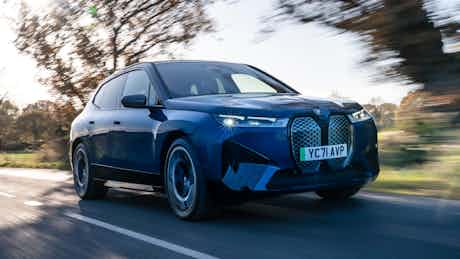Are electric cars heavier than petrol cars?
November 10, 2023 by Jamie Edkins

Do electric cars weigh more than petrol and diesel cars?
Generally speaking, electric cars will be quite a bit heavier than those powered by an internal combustion engine. This is thanks to the large battery pack which you’ll find under the floor.
Let’s look at the Peugeot 208 as an example, a small hatchback which is available with either a petrol engine or as an electric car. If you go for the 1.2-litre petrol model, it tips the scales at 1,090kg. On the other hand, the all-electric e-208 with its 50kWh battery weighs in at 1,910kg, almost double the amount.

This theme continues with premium brands as well. The BMW 4 Series Gran Coupe weighs 1,695kg when you opt for the basic petrol model, however this rises to 2,065kg in the electric i4 with a 70kWh battery. Go for the larger 84kWh battery and you’ll be lugging around 2,125kg.
Why does it matter if electric cars are heavier?
Most of the time, it doesn’t really matter if your car is heavier. When you’re driving around normally in daily use, you probably won’t notice the extra weight.
That’s not to say there are no drawbacks to having a heavy car though. When you add weight to a car, manufacturers usually have to beef up the suspension to prevent the car from rolling about too much in the bends. This can result in the car feeling a bit firmer over bumps around town.
Another place where you may notice the extra weight is in the corners, where the added mass can make the car feel less responsive. Again, unless you’re throwing the car down a backroad at enthusiastic speeds you’re unlikely to notice.
If having fun behind the wheel is high up on your list of priorities though, petrol-engined models will usually be a better option. If your heart is set on an EV, and you still want to have fun, the Cupra Born is a safe bet. If your budget stretches to something like a Porsche Taycan GTS, that car hides its two ton mass very well indeed.
The final thing you’ll want to watch out for is efficiency, because adding weight will mean the car uses more energy, and therefore costs more to run. If you look at the BMW iX1 for example, the version with a smaller battery is lighter, and has a claimed efficiency of up to 4.0 miles per kWh. This drops to 3.6 miles per kWh if you go for the heavier model with a larger battery and dual motors.

Do the tyres wear out faster on electric cars?
This is something to consider if you’re thinking about buying an electric car, because the added weight means that they usually have specially-designed tyres.

If you were to put normal tyres on an EV, they would wear out quite quickly. This is because the extra weight would put too much strain on the sidewalls. The way EVs deliver their power instantly would also contribute to faster wear.
As a result, manufacturers tend to develop specific tyres for their EVs with improved rubber compounds and a stronger structure, as well as less resistance for added efficiency. This should prolong the life of the rubber, provided you drive sensibly, however they’ll be more expensive to replace.
Car Change? Carwow!
Looking for a new set of wheels? With Carwow you can sell your car quickly and for a fair price – as well as find great offers on your next one. Whether you’re looking to buy a car brand new, are after something used or you want to explore car leasing options, Carwow is your one stop shop for new car deals.















